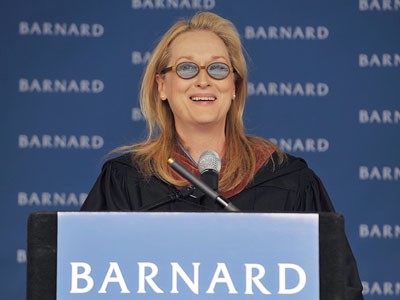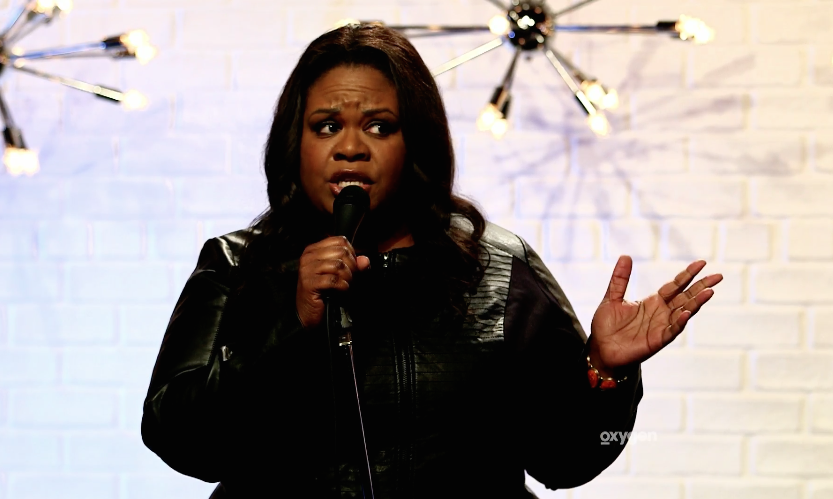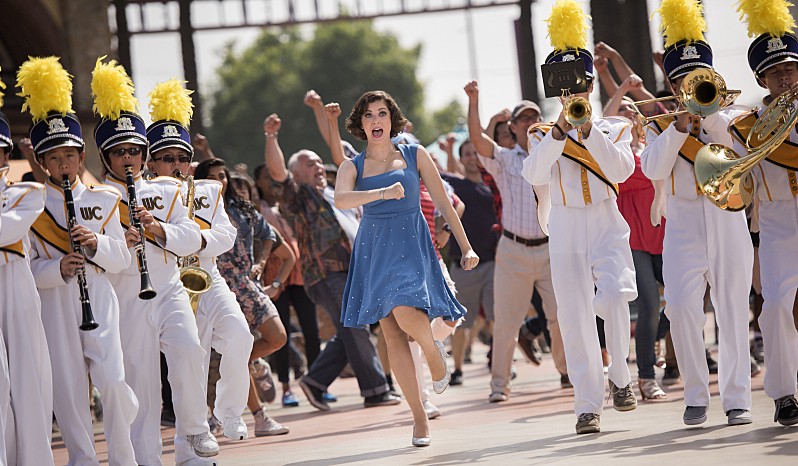Earlier this week, Terry Gross broadcast a provocative interview with Meryl Streep on her NPR program Fresh Air.
The interview was tied to Streep’s unprecedented 17th Oscar nomination for her role as Margaret Thatcher in The Iron Lady. But Gross also used the opportunity to ask Streep about some insightful comments she made during her Commencement Address to the graduates of Barnard College in 2010.
First here are some excerpts from Streep’s Barnard speech:
The hardest thing in the world is to persuade a straight male audience to identify with a woman character. It’s easier for women because we were brought up identifying with male characters in literature. It’s hard for straight boys to identify with Juliet or Wendy in Peter Pan, whereas girls identify with Romeo and with Peter Pan…
They [men of my generation] professionally can’t hear us…
GROSS: …I want to quote something else you said, and this was in the Barnard speech that you gave in 2010, that “The hardest thing in the world is to persuade a straight male audience to identify with a woman character. It’s easier for women because we were brought up identifying with male characters in literature. It’s hard for straight boys to identify with Juliet or Wendy in Peter Pan, whereas girls identify with Romeo and with Peter Pan.” What led you to that conclusion?
STREEP: I watch movies and I don’t care who is the protagonist, I feel what that guy is feeling. You know, if it’s Tom Cruise leaping over a building I, I want to make it, you know? And I’m going to, yes, I made it. And yeah, so I get that.
And I’ve grown up, well, partly because there weren’t great girls’ literature. Nancy Drew maybe. But there weren’t things. So there was Huck Finn and Spin and Marty. The boys’ characters were interesting and you lived through them when you’re watching it. You know, you’re not aware of it but you’re following the action of the film through the body of the protagonist.
You know, you feel what he feels when he jumps, when he leaps, when he wins, when he loses. And I think I just took it for granted that, you know, we can all do that. But it became obvious to me that men don’t live through the female characters.
GROSS: Do you think that women have that kind of double consciousness and men, you think, like, boys… don’t make that leap…
STREEP: Well, it has to do with very deep things, you know, because it might be that imagining yourself as a girl is a diminishment…But I don’t know, I really think there’s a difference between how men critics see things than how women tend to…
***********
Streep is making points I’ve been trying to make for years now, but much more eloquently (of course). Over & over again, year after year, people read Martha Lauzen’s “Celluloid Ceiling” reports & draw the wrong conclusions. You can’t simply ignore the denominator (the part about “the 250 top-grossing films of 2011″) and still trumpet her metric.
Since becoming a film critic, here’s something I know that most of you don’t: the number of films released in Chicago in 2011 was approximately 600. And that doesn’t count many of the films that played at our local film festivals, films released in LA &/or NYC that never got released here, and films that went straight to DVD, etc.
Here’s what is true: Only 5% of 2011′s commercially successful films were directed by women. Put another way: Men directed 95% of the films available to most of you in your local multiplex.
The typical solution offered in discussions of the Celluloid Ceiling problem is to create more opportunities for women filmmakers. That’s fine with me and I’m all for it, but I don’t believe that will solve the problem. It also lets us all off the hook. We can keep whining about “the problem” without having to do anything proactive to solve it.
Many wonderful films written and/or directed by women have been released in the past decade. Despite all the obstacles, many women have, in fact, completed their films; that is not the problem. The films are there, but what’s missing is the audience.
A different diagnosis suggests a different treatment plan: We need more women film critics to balance out the male critics who “professionally can’t hear us,” and we need more committed audiences willing to “to identify with a woman character.”
As Streep says, “There is only change and resistance to it and more change.”
__________________________________________________
Jan Lisa Huttner blogs as “The Hot Pink Pen.” Her new book Penny’s Picks: 50 Movies by Women Filmmakers is available from Amazon in paperback and on Kindle.







